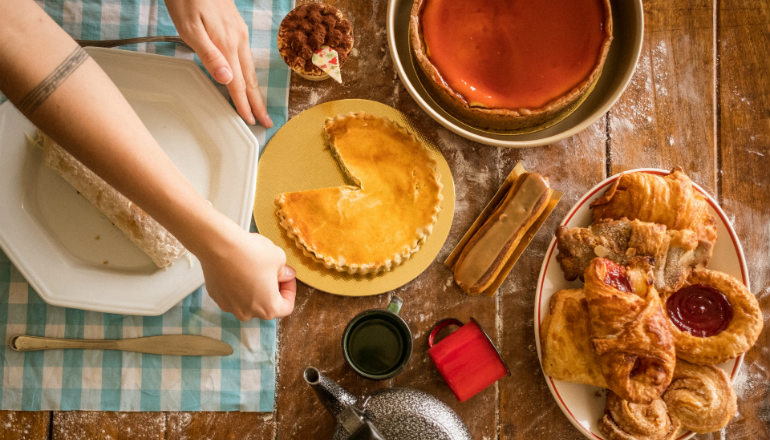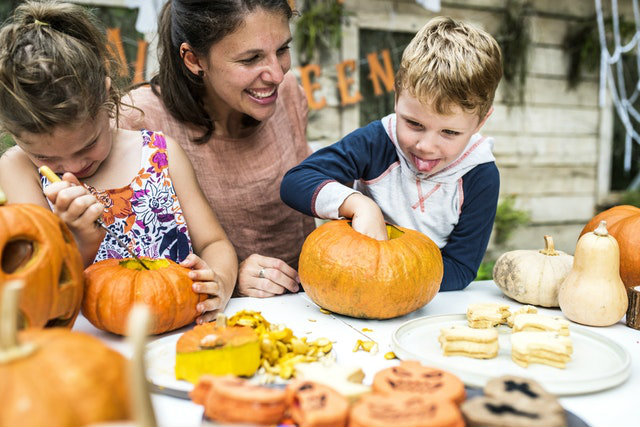
I used to approach Thanksgiving like an endurance event.
I’d eat as little as possible all day until the drinks and appetizers appeared, saving myself for the big meal. Dizzy with hunger, I’d talk and sip wine and start in on the appetizers, munching mindlessly until the meal was ready.
Then, because it was Thanksgiving, I’d load my plate up with every single item, even things I didn’t particularly like. I’d go back for seconds, because that’s the point of Thanksgiving, right? To eat until you’re uncomfortably full?
I’d end up so full I couldn’t enjoy or taste my favorite part of Thanksgiving: pumpkin pie. I’d finish the night unhappy and exhausted, a feeling that stuck with me for days.
Unsurprisingly, I grew to dislike the holiday.
How I Changed My Approach to Thanksgiving
This was a shame, because Thanksgiving is one of the few holidays that isn’t associated with gifts and candy. The holiday is still primarily about family, loved ones, and home-cooked food — all things that are an important part of a healthy life and the Whole Life Challenge.
It wasn’t until I hosted Thanksgiving myself for the first time that I changed my approach. On that day, I woke up early and ate a good breakfast, knowing I’d need energy for the work ahead. I was on my feet moving around all morning, cooking and getting the house ready, and by noon I was hungry again, so I ate a small snack.

Once everyone arrived in the late afternoon, I was so busy talking and making sure everyone had drinks I didn’t have a chance to eat any appetizers. When I sat down for the meal I was hungry but not starving, so I chose only what I really wanted to eat, leaving room for my beloved pumpkin pie.
This experience showed me I could change my approach to a holiday — but still participate fully. And that nobody cares how much you eat or drink as long as you are present.
If the holidays are a difficult time for you, or if you struggle to maintain your healthy habits from November to January, here are four tips to stay happy and healthy through the holiday season.
1. Keep Moving
I never feel like exercising over the holidays and on vacation, but I always force myself to go for a jog or fit in a quick visit to a gym. I’ve learned that exercise is essential for my mental health. It regulates my mood, calms my anxiety, and helps me sleep. The time alone is also a welcome break from socializing, giving me some much-needed quiet in a season of parties and large gatherings.
As much as you don’t want to leave the comfort of the couch, try to incorporate some kind of movement into the holidays. If it’s not possible to get away, you could also propose a group activity like a walk, a bike ride (if weather permits), or even something unusual like a visit to an indoor trampoline park. Everyone’s mood will improve, and the change of scenery could also reduce the likelihood of family conflict.

2. Eat Mindfully
The holidays can be difficult for those of us trying to practice healthy habits because we are frequently put into situations where we aren’t in control of our environment. I eat well most of the time because I don’t keep unhealthy food in the house. However, my resolve crumbles when faced with a table of desserts (especially after a few drinks). Therefore, I can easily get into a situation where I’m putting handfuls of chips in my mouth while deep in conversation, only realizing later I didn’t enjoy a single bite.
Instead of vowing to avoid every treat or temptation in front of you this holiday season, try to stop and appreciate what you’re eating. Sip your cocktail slowly. Enjoy every bite of pie. If you’re going to indulge, do it mindfully and with intention.
3. Say No
Another danger of the holiday season is spreading yourself too thin. This can lead to less sleep and skipping workouts. You might have trouble finding time to meditate or do your normal meal prep, and before you know it you’ve sabotaged the progress you’ve made all year.
One way to avoid overextending yourself during the holiday season is to approach parties and obligations like a Thanksgiving spread. Just like you don’t have to try every dish at Thanksgiving, you also don’t have to accept every invitation. This doesn’t mean you can ditch important events, like an office holiday party or dinner, but you can say no to smaller events if you’re feeling overwhelmed.
If holiday shopping is a source of stress, consider talking with your friends and family and agreeing to share an experience instead of giving gifts. Decline events that aren’t essential and use that time to recharge by eating well, exercising, meditating, and getting a good night’s sleep.

4. Start New, Healthy Traditions
Traditions are important, but you should also feel free to ditch those that don’t serve you and your family — and instead incorporate new holiday rituals. These rituals could be things like:
- A post-dinner, pre-dessert walk on Thanksgiving.
- Spending Black Friday volunteering instead of shopping.
- Rather than baking cookies with your kids, find a holiday craft to do together.
It’s possible to maintain the spirit of tradition and encourage family togetherness while getting rid of unnecessary sugar consumption, but first you have to take a close look at the traditions you’ve followed for years and decide if they work with your life at the moment.
Wishing a Healthy Thanksgiving to You
The most important thing to remember during the holidays is that you are in charge of how you spend your time and what you consume. It isn’t a requirement that you eat terribly or stop exercising. You can choose to enjoy a treat or redefine what “treat” means to you. You can make your holiday experience conform to your new healthy habits, and the Whole Life Challenge is here to give you accountability and structure along the way.



































